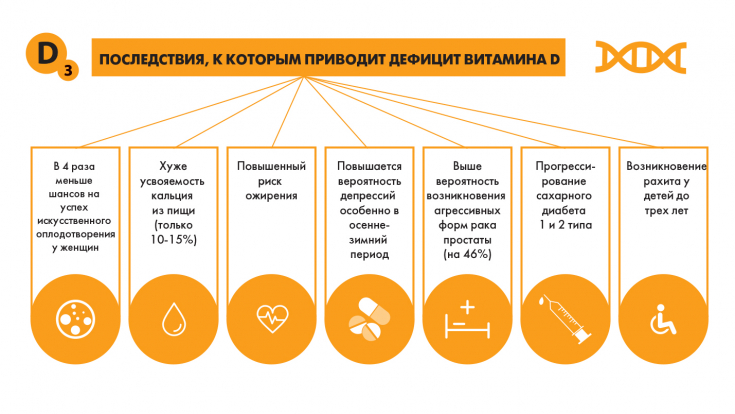Vitamin D is involved in the exchange of calcium and phosphorus in the body and maintains their balance. Also, one of the functions of vitamin D is the production of the antimicrobial peptide cathelicidin, which helps the body cope with infections. Vitamin D deficiency allows diseases to attack the human body. But, unfortunately, it is very difficult to independently identify a vitamin deficiency, because it does not have any special indicators.
Today, the editors of estet-portal will tell you what are the symptoms of vitamin D deficiency and what threatens a person with a lack of this element.
- Why Vitamin D Deficiency Occurs: Symptoms
- What is the effect of vitamin D deficiency?
- What to do if you find a deficiency of vitamin D
Why Vitamin D Deficiency Occurs: Symptoms
Often a vitamin D is also called the sunshine vitamin. After all, its main source is the sun's rays. It is because of the lack of sunlight that a person may develop vitamin D deficiency. To restore the amount of this important element, doctors recommend the use of nutritional supplements, especially during the cloudy season.
Follow us on Instagram!

Vitamin D is essential for the absorption of calcium. That is why, if its amount is not enough, the condition of bones, teeth and nails worsens in a person.
Subscribe to our page on Facebook!
Also, vitamin D is one of the main helpers of immunity. If there is a deficiency of this element, the body passes diseases more easily and it is more difficult for it to fight with them.
What is the effect of vitamin D deficiency
Prolonged lack of vitamin D can cause secondary adenomas (benign growths) of the parathyroid glands. And also, due to deficiency, the risk of bone fractures increases.

In addition, vitamin D deficiency has a negative impact on a person's mental state. Causes feelings of depression, lack of energy, fatigue and can even cause depression.
Vitamin D deficiency can increase the effectiveness of the appetite hormone (leptin). This can cause overeating, as a result of which — digestion problems and weight gain. What to do if you have a vitamin D deficiency
There are several ways to regulate
vitamin D levels
in the body. The best way is, of course, the sun. If it's sunny outside — spend more time outside and eat the sun. Unfortunately, the weather cannot be controlled by humans, so sometimes it is necessary to replace the natural source of vitamin D.

It could be nutritional supplements. They are recommended to be taken at a time when there is little sunlight. On average — from October — to April. In addition, certain foods are also sources of vitamin D. Among them are salmon, mackerel, tuna, sardines, dairy products (fresh), cheese, yogurt, eggs and mushrooms.
See more important and useful information on
YouTube:






Add a comment